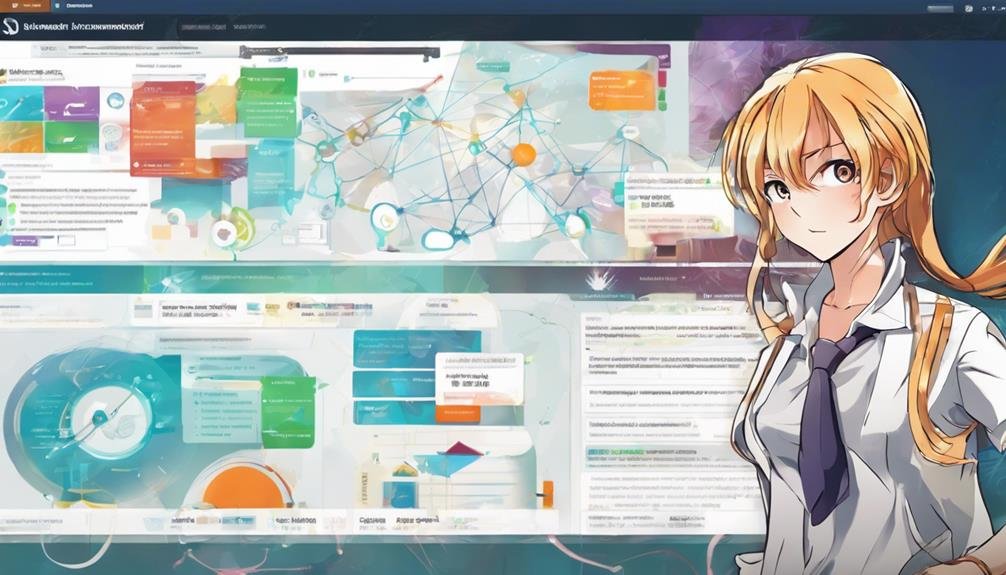What Are the Key Components of a Successful Learning Management System (Lms)?
In a successful Learning Management System (LMS), you need a user-friendly interface for easy navigation. Robust analytics provide insights into performance and engagement. Customization options personalize the learning journey. Mobile compatibility guarantees access anywhere. Scalability features handle growth and integrate seamlessly with other systems. Combine these elements for an enhanced learning experience.
Key Takeaways
- User-Friendly Interface for seamless interaction and easy navigation
- Robust Analytics Features for data visualization and predictive insights
- Customization and Personalization Abilities for individualized learning experiences
- Mobile Compatibility for access on the go and interactive content engagement
- Scalability and Integration Options for handling large user bases and seamless system integration
User-Friendly Interface
When using a Learning Management System, a user-friendly interface is vital for enhancing the overall user experience and facilitating seamless interaction with the platform. An intuitive design allows you to navigate through the system effortlessly, finding the tools and resources you need without unnecessary confusion. Picture a dashboard that's clean, organized, and visually appealing, making it easy for you to locate your courses, assignments, and grades at a glance.
Smooth navigation within the LMS guarantees that you can move from one section to another without feeling lost or overwhelmed. Imagine being able to access different modules with just a few clicks, saving you time and frustration while increasing your productivity. With intuitive buttons and clear menu structures, you can focus on learning and collaborating rather than struggling to find your way around the system.
Robust Analytics Features
To maximize your learning potential and track progress effectively, a Learning Management System should incorporate robust analytics features that provide valuable insights into your performance and engagement. These analytics tools offer you the opportunity to enhance your learning experience through data visualization and predictive insights.
- Data Visualization: Visual representations of your learning data, such as graphs and charts, make it easier for you to comprehend your progress and identify areas for improvement.
- Predictive Insights: By analyzing your past performance and engagement patterns, the system can offer predictions on future learning outcomes, helping you stay on track and reach your goals.
- Engagement Metrics: Tracking your engagement levels with different learning materials can help you understand what methods work best for you, allowing for personalized learning experiences tailored to your preferences and needs.
With these robust analytics features, you can gain a deeper understanding of your learning journey and make informed decisions to optimize your educational experience.
Customization and Personalization Abilities
For a truly tailored learning experience that caters to your individual needs and preferences, a Learning Management System should offer extensive customization and personalization abilities. Customization options within an LMS empower you to personalize your learning journey by choosing specific themes, layouts, and even functionalities that align with your learning style. By having the freedom to customize the interface to suit your preferences, you can create a more engaging and user-friendly environment that enhances your overall learning experience.
Furthermore, individualized learning opportunities play an essential role in ensuring that the content delivered through the LMS resonates with you on a personal level. Through personalized learning paths, adaptive assessments, and tailored content recommendations, an LMS can cater to your unique strengths and areas for development. This level of customization and personalization fosters a more productive and enjoyable learning experience, ultimately leading to better knowledge retention and skill development. By harnessing the power of customization and personalization features in an LMS, you can take control of your learning journey and achieve your educational goals more effectively.
Mobile Compatibility
Enhance your learning experience by ensuring seamless access on the go with a mobile-compatible Learning Management System. When considering mobile compatibility, there are several key features to look out for that can greatly enhance your learning journey:
- Offline Access: Enjoy the flexibility of learning even without an internet connection, ensuring that your educational materials are accessible anytime, anywhere.
- Interactive Content: Engage with your learning material through interactive elements that make the learning process more dynamic and effective.
- Cross Platform Compatibility: Access your learning content across various devices and operating systems, providing you with the freedom to learn on the device of your choice.
Scalability and Integration Options
Ensure that your learning management system is equipped to grow with your needs and seamlessly integrate with other tools by exploring the scalability and integration options available.
Scalability challenges can arise when your user base expands, and your LMS struggles to keep up with the demand. To combat this, look for an LMS that offers scalability features such as the ability to handle a large number of users, courses, and data without compromising performance.
Integration strategies are essential for ensuring that your LMS can work harmoniously with other systems like HR software, content libraries, or video conferencing tools. By choosing an LMS that supports seamless integration through APIs or plugins, you can create a unified learning ecosystem that enhances user experience and streamlines administrative tasks.
Consider the compatibility of your LMS with existing and future tools to future-proof your learning infrastructure and adapt to evolving needs effortlessly.
Conclusion
As you navigate through the vast sea of information, remember the key components of a successful learning management system.
Just like a well-oiled machine, it should offer a user-friendly interface, robust analytics features, customization options, mobile compatibility, and scalability.
Imagine a ship sailing smoothly through calm waters, effortlessly adapting to the changing tides and weather conditions.
Your LMS should be your trusted vessel, guiding you towards your learning goals with ease and efficiency.







